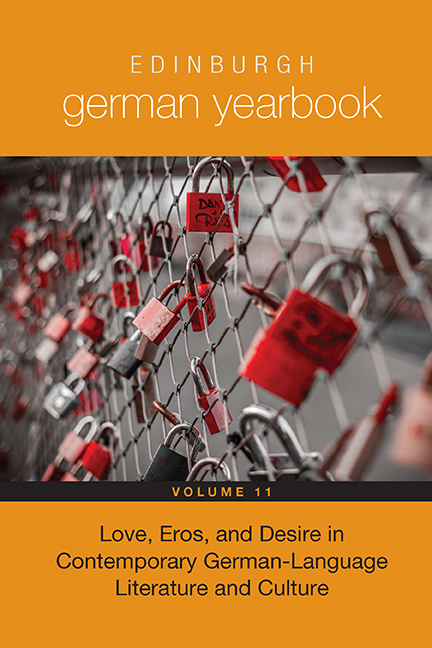 Edinburgh German Yearbook 11
Edinburgh German Yearbook 11 Book contents
- Frontmatter
- Contents
- Introduction: Love, Literature, (Post-)Modernity: On the Re-Emergence of Love in Contemporary German Literature
- Revisions of Romantic/Literary Traditions
- Not So Happily Ever After: Romantic Love in Novels by Alain Claude Sulzer
- Love as Literature: Hanns-Josef Ortheil's Die große Liebe
- Variations on Love in the Contemporary
- Love and Cultures of Exclusion
- Notes on the Contributors
Love as Literature: Hanns-Josef Ortheil's Die große Liebe
from Revisions of Romantic/Literary Traditions
Published online by Cambridge University Press: 21 August 2019
- Frontmatter
- Contents
- Introduction: Love, Literature, (Post-)Modernity: On the Re-Emergence of Love in Contemporary German Literature
- Revisions of Romantic/Literary Traditions
- Not So Happily Ever After: Romantic Love in Novels by Alain Claude Sulzer
- Love as Literature: Hanns-Josef Ortheil's Die große Liebe
- Variations on Love in the Contemporary
- Love and Cultures of Exclusion
- Notes on the Contributors
Summary
Helmut Schmitz, University of Warwick
“HAPPY LOVE,” remarks Denis de Rougemont, “has no history. Romance only comes into existence where love is fatal, frowned upon and doomed by life itself.” Noting that the history of love in Western European literature begins in the twelfth century with a story of an adulterous couple—Tristan and Isolde—de Rougemont reminds us that literature knows mainly unhappy and unfulfilled love stories. From the medieval love poetry of the Provencal troubadours via Dante and Beatrice, Petrarch and Laura, to Romeo and Juliet; in the literary tradition of Europe between the medieval period and the Renaissance, love and suffering belong closely together.
In the modern “literary” novel, there is likewise no happiness in love to be found. However, modern love is unhappy for different reasons than pre-modern love. Love in the modern novel is unhappy not (just) as a result of the conflict-ridden structure of desire or because of insurmountable social obstacles but as a reflection of the overburdening of the subject in relation to an increasingly diversified, stratified, and administered society. A number of social theorists comment on the increasing fragmentation of the modern bourgeois subject into to a variety of social roles in the transformation from a feudal to a bourgeois society in the mid to late eighteenth century. This creates a situation where the public role of administrative work and the private, domestic existence of the bourgeois subject can no longer be easily brought into harmony. In this destabilizing social situation, love and intimate relationships become charged with the promise of restoring balance and happiness to the individual in the domestic sphere, promising him/her the recognition the outside world increasingly withholds. With reference to Niklas Luhmann's theory of social stratification, which sees the subject in an increasingly diversified set of social roles, Karin A. Wurst argues that love turns into a compensatory discourse that is supposed to stabilize the bourgeois self within a domestic harmony. The home and the relationship with the designated (female) Other becomes the space where the (male) subject wants to experience his whole persona in the exchange with the partner.
- Type
- Chapter
- Information
- Edinburgh German Yearbook 11Love, Eros, and Desire in Contemporary German-Language Literature and Culture, pp. 47 - 70Publisher: Boydell & BrewerPrint publication year: 2017
- 1
- Cited by
